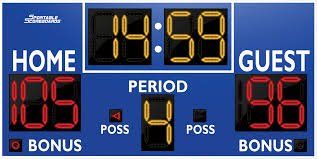Don't Keep Score
Brock Wissmiller, Assoc. A.D. - Upper Iowa University
Scoreboard watching. A phrase that is common in sports, especially when a team is in a playoff/championship race. Scoreboard watching is something, which I feel, comes with human nature. We want to compare ourselves to others and track our progress against those around us. This is competition and something that drives us all within the athletic world.
With all that said I am here to tell you to stop watching...at least when it comes to success on the external side. Whatever avenues that you take to generate revenue in your department(i.e. fundraising, tickets, sponsorships, camps, etc…), you have to be able to define what is successful for you and you alone. There is no shortage of press releases put out through the college athletics world touting how ABC State University generated however many millions of dollars in ticket revenue or XYZ Private College set a new high for their athletic donor club giving last year. These figures have trickled down to small college athletics as well, and trying to live up to them can be a daunting task.
Let me paint a picture for you with how success is relative to where you are. I had a recent discussion with a colleague centering on basketball attendance. This person’s school averages around 1,500 fans per basketball game. At Upper Iowa our average is around 300, with a peak of about 700 this season. The person I was talking with said it must be tough to draw in such a small town. I responded that our goal is to lead the nation in per capita attendance .
Likewise, my competitive juices get flowing when I see a fellow NCAA Division II school, especially within the Northern Sun Intercollegiate Conference (UIU’s conference), announce that they’ve eclipsed $1,000,000 in fundraising for their year. It is important to remember that it cannot happen everywhere and that $100,000 at one school can seem like $1,000,000 somewhere else.
I believe that the most important part of building an external revenue plan is having a clear destination of where you want to grow it. This may require benchmarking and comparisons, which I realize completely undermines everything I just wrote. However, it is important to set your efforts on a path that is realistic to what you are capable of doing at your institution. The bottom line is that the goal/direction is what matters and what will help to guide your efforts externally.
As essentially a one-person shop for all fundraising, sponsorships, ticket sales, etc…at Upper Iowa, I have learned through trial, and more than a fair amount of error, that knowing your position is all that really matters. I borrow great ideas on a daily basis, but I also keep in perspective that not every plan will translate to a town of 1,500. What has changed my annually planning the most in recent years has been the perspective of a longer-term goal. I know that there needs to be annual growth and gains. However, I have not let the immediate goal supersede the realization that long-term growth is what we all crave. I would rather a donor give me $50 now, and for the next five years, then they give $100 now and I never hear from them again.
Simon Sinek delivered a great speech on the difference between finite and infinite games. Working in athletics, where score is kept and winners are determined, Sinek’s concept of infinite games seems a little out of place. However, we are all playing an infinite game of external revenue development. There is no completion to our task. The goal will always be there and every year the goal will be evaluated and re-adjusted. The game will go on and eventually we learn that there is no final victory in our world.
Whatever the area of external growth, keep the focus on the growth of the relationship. There is no end game or victory in building relationships…they are an infinite game, if you will. Set realistic goals, pursue them aggressively, and take pride in your efforts…regardless of how the total revenue generated compares to anyone other institution.


